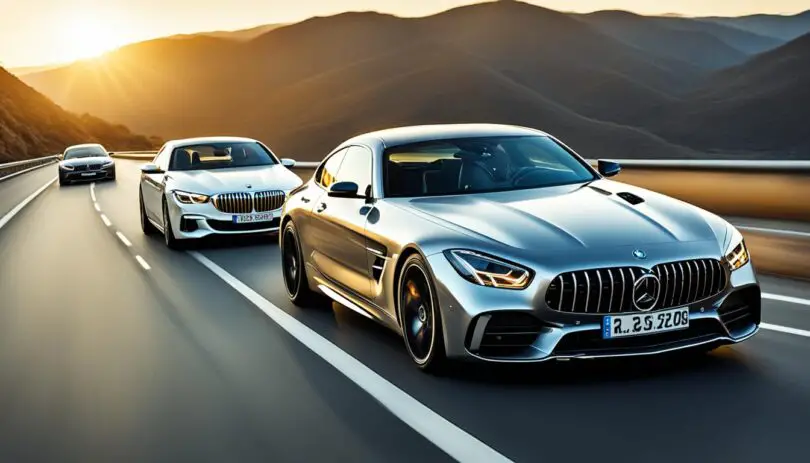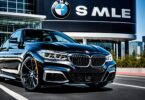When it comes to luxury cars, BMW and Mercedes-Benz are two of the top contenders. Both brands have a long history of producing high-quality vehicles that cater to different needs and preferences. In this guide, we will explore the key factors to consider when choosing between a BMW and a Mercedes, including performance, features, and value for drivers in Lithuania.
Performance Comparison: BMW vs Mercedes
When it comes to performance, BMW and Mercedes are two luxury car brands that offer exceptional driving experiences. While they share similarities in terms of performance levels, there are notable differences that set them apart.
Mercedes-Benz vehicles are often equipped with larger engines, providing more power and higher top speeds. For instance, the average Mercedes C-class has the capability to reach up to 225 km/h and accelerate from 0-100 km/h in 7.1 seconds.
On the other hand, BMWs tend to have smaller yet more efficient engines, leading to better fuel economy without compromising performance. Take the average BMW 3-series, for example, reaching up to 210 km/h with an acceleration from 0-100 km/h in just 5.7 seconds.
Let’s explore this performance comparison further:
| Car Brand | Engine Power | Acceleration (0-100 km/h) | Top Speed |
|---|---|---|---|
| Mercedes C-class | Larger engines | 7.1 seconds | Up to 225 km/h |
| BMW 3-series | Smaller, efficient engines | 5.7 seconds | Up to 210 km/h |
As you can see from the table above, Mercedes C-class offers a higher top speed but sacrifices a bit of acceleration compared to the BMW 3-series. However, the smaller engines in the BMW provide better fuel efficiency.
Whether you prioritize raw power or fuel economy, both BMW and Mercedes offer a range of models to suit your preferences and driving style.
Features and Technology: BMW vs Mercedes
Both BMW and Mercedes are renowned for equipping their vehicles with top-of-the-line features and cutting-edge technology. The interiors of these luxury brands prioritize comfort and opulence, boasting premium materials and meticulous attention to detail that elevate the driving experience.
One of the standout features in BMW vehicles is the iDrive infotainment system. It offers an intuitive interface and a wide range of connectivity options to keep you seamlessly connected on the road. Mercedes, on the other hand, features the MBUX infotainment system, which combines artificial intelligence and voice recognition technology for a truly interactive and personalized experience.
When it comes to safety, both BMW and Mercedes make no compromises. Advanced safety features are a standard inclusion across their lineups, ensuring your peace of mind on every journey. However, Mercedes has earned a reputation for being one of the safest car brands on the market, incorporating innovative technologies such as the PRE-SAFE system, which automatically prepares the vehicle for potential accidents.
Let’s take a closer look at the features and technology offered by BMW and Mercedes:
BMW Features and Technology
- iDrive infotainment system
- Intuitive interface and extensive connectivity options
- Advanced safety features, including automatic emergency braking and lane departure warning
Mercedes Features and Technology
- MBUX infotainment system with artificial intelligence and voice recognition
- Premium sound systems for an immersive audio experience
- Innovative safety features, such as the PRE-SAFE system
As you can see, both BMW and Mercedes excel in delivering state-of-the-art features and technology. Whether you prioritize seamless connectivity, advanced safety, or immersive audio, these luxury brands have you covered.
I believe that the features and technology offered by BMW and Mercedes truly set them apart in the luxury car market. The attention to detail and the level of craftsmanship in their interiors is unparalleled. Not to mention the advanced infotainment systems and safety features that enhance both convenience and peace of mind on the road.
Stay tuned for the next section, where we will delve into the value and price considerations when it comes to BMW and Mercedes vehicles.
Value and Price: BMW vs Mercedes
Owning a luxury car like a BMW or Mercedes comes with a higher price tag compared to economy brands. However, both brands offer value for money in terms of the overall driving experience and the prestige associated with owning a luxury vehicle. Let’s take a closer look at the costs involved in owning a BMW or a Mercedes.
Maintenance Costs
When it comes to maintaining a luxury car, both BMW and Mercedes have higher maintenance and repair costs compared to economy brands. However, it’s important to note that BMW parts generally tend to be more expensive than Mercedes parts. This can impact the overall cost of ownership, especially if significant repairs or replacements are needed. It’s advisable to factor in these costs when considering the long-term ownership of a luxury car.
Insurance Costs
Insuring a luxury car can be more expensive compared to regular cars, and both BMW and Mercedes are no exception. On average, insurance premiums for BMWs tend to be slightly higher than for Mercedes cars. However, it’s important to keep in mind that insurance costs can vary depending on factors such as the model, year, driver age, and location. To get the best coverage and rates for your chosen luxury car, it’s crucial to shop around and compare insurance quotes from different providers.
| Average Yearly Maintenance Costs (£) | Average Insurance Premiums (£) | |
|---|---|---|
| BMW | 1,300 | 907 – 2,191 |
| Mercedes | 1,220 | 562 – 1,987 |
Note: The above figures are averages and may vary depending on various factors.
Despite the higher maintenance and insurance costs, owning a BMW or Mercedes can still provide value for money. These luxury vehicles offer a superior driving experience, advanced features, and a sense of prestige that cannot be matched by economy brands. The decision ultimately comes down to personal preference and the value you place on owning a luxury car.
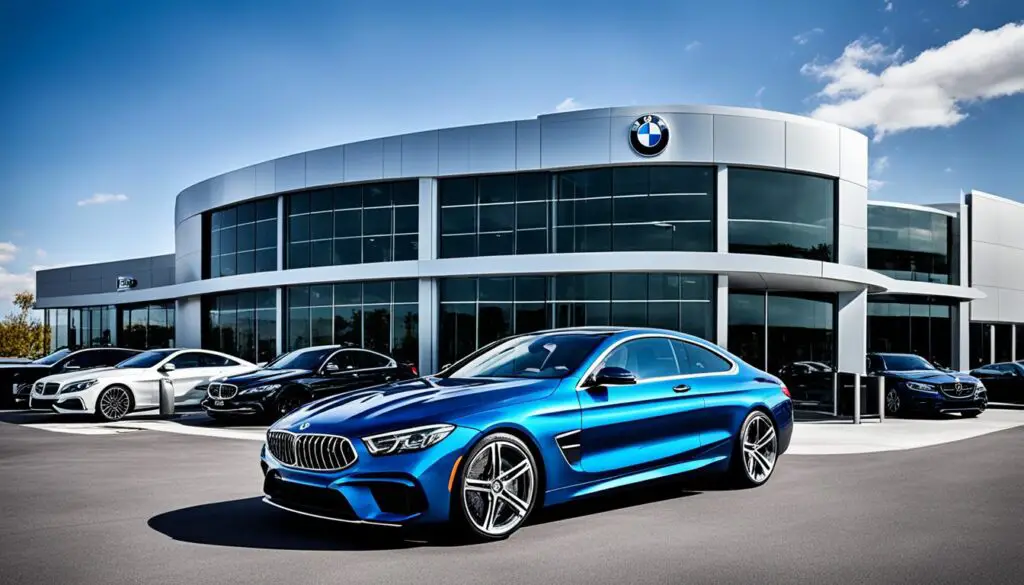
Reliability and Safety: BMW vs Mercedes
When it comes to reliability and safety, both BMW and Mercedes are highly regarded in the luxury car market. While BMWs may have slightly lower reliability ratings compared to Mercedes, both brands perform well in safety tests and offer a wide range of standard safety features.
Mercedes is particularly known for its commitment to safety, with advanced technologies like the PRE-SAFE system. This system automatically prepares the vehicle for potential accidents, ensuring maximum safety for the driver and passengers. BMW also includes advanced safety features such as automatic emergency braking and lane departure warning, providing peace of mind on the road.
Here is a comparison of the safety ratings and safety features of BMW and Mercedes:
| Brand | Safety Ratings | Safety Features |
|---|---|---|
| BMW | 4 out of 5 stars* |
|
| Mercedes | 5 out of 5 stars* |
|
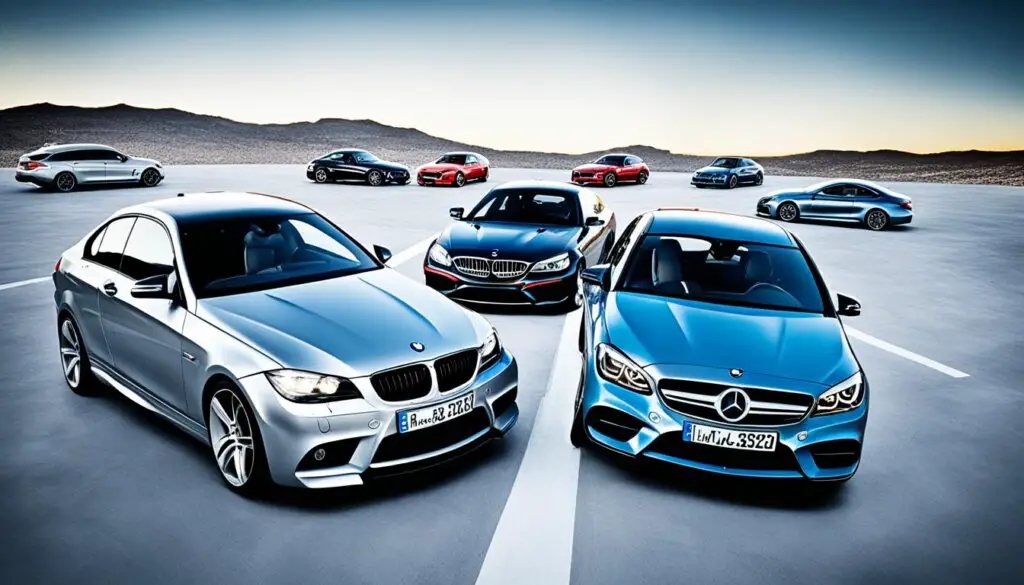
As you can see, both brands prioritize safety and equip their vehicles with advanced safety features. However, Mercedes tends to have higher safety ratings, indicating its commitment to providing a secure driving experience. Ultimately, the choice between BMW and Mercedes comes down to personal preference and weighing the importance of reliability and safety features in your decision-making process.
Sedans: BMW 3-series vs Mercedes C-class
When it comes to entry-level luxury sedans, the BMW 3-series and the Mercedes C-class are highly sought-after options. These models deliver a comfortable ride coupled with an array of impressive features, providing a taste of luxury for discerning drivers. With features such as dual-zone climate control, advanced suspension, and infotainment systems, both the BMW 3-series and the Mercedes C-class prioritize the driver’s comfort.
However, there are distinct differences that set these sedans apart. The BMW 3-series excels in sportiness and driving dynamics, appealing to enthusiasts who enjoy a spirited driving experience. On the other hand, the Mercedes C-class places emphasis on luxurious comfort, providing a refined and smooth ride that prioritizes relaxation during every journey.
Ultimately, the choice between the BMW 3-series and the Mercedes C-class comes down to personal preference. If you crave a sportier driving experience and enjoy the thrill of the road, the BMW 3-series is the ideal choice. Alternatively, if you seek the epitome of comfort and desire a more refined ride, the Mercedes C-class offers the perfect blend of luxury and relaxation.
Comparison Table: BMW 3-series vs Mercedes C-class
| Features | BMW 3-series | Mercedes C-class |
|---|---|---|
| Dual-Zone Climate Control | Yes | Yes |
| Infotainment System | BMW iDrive | Mercedes MBUX |
| Advanced Suspension | Yes | Yes |
| Sportiness | High | Medium |
| Comfort | Medium | High |
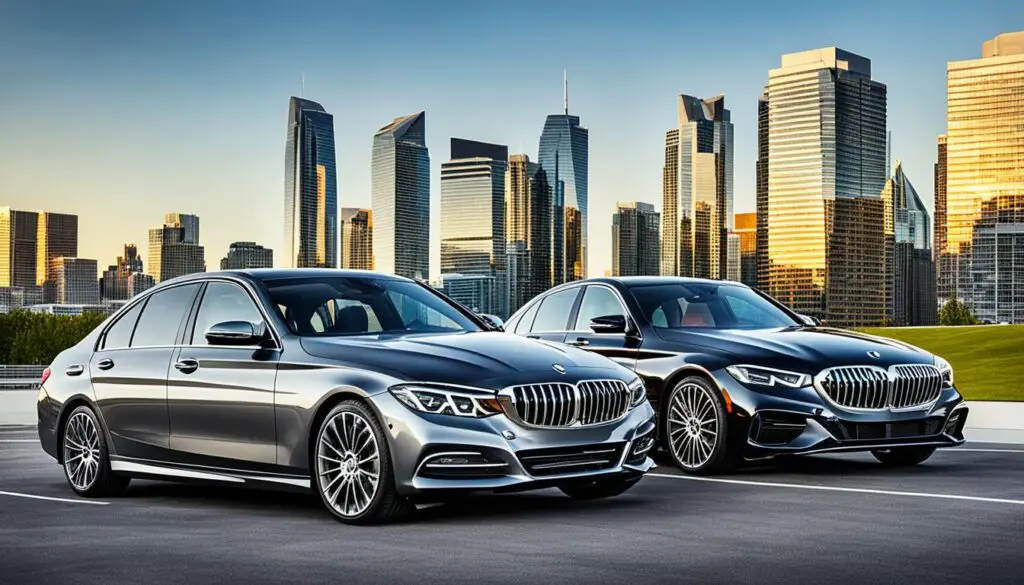
SUVs: BMW X3 vs Mercedes GLB
When it comes to luxury SUVs, the BMW X3 and the Mercedes GLB are two outstanding contenders. Both models offer the perfect combination of practicality, power, and luxury, catering to the discerning needs of SUV enthusiasts in Lithuania. While the BMW X3 emphasizes efficiency, the Mercedes GLB focuses on providing exceptional comfort and style.
The BMW X3 boasts slightly better fuel economy, making it an excellent choice for those who prioritize efficiency and long drives. With its agile handling and responsive performance, the X3 ensures a thrilling and enjoyable driving experience. Additionally, the X3’s spacious interior and ample cargo space make it a practical option for families and adventurous individuals.
On the other hand, the Mercedes GLB showcases its commitment to luxury, offering a more opulent and indulgent interior. With its refined styling and premium finishes, the GLB exudes elegance and sophistication. It provides a comfortable and serene ride, making it ideal for long journeys and everyday commuting in style.
Let’s take a closer look at the key features and specifications of these exceptional luxury SUVs:
| Model | BMW X3 | Mercedes GLB |
|---|---|---|
| Fuel Economy* (L/100 km) | 7.3 | 8.3 |
| Engine Power (hp) | 248 | 221 |
| Cargo Space (liters) | 550 | 570 |
| Starting Price (£) | £42,550 | £39,355 |
*Fuel economy values are approximate and may vary based on driving conditions and configurations.
As seen in the table above, the BMW X3 offers better fuel efficiency, while the Mercedes GLB provides a slightly more spacious cargo area. The starting prices for both models are quite similar, ensuring that luxury and versatility are accessible to a wide range of SUV enthusiasts.
Ultimately, deciding between the BMW X3 and the Mercedes GLB depends on your personal preferences and priorities. If you value fuel efficiency and a sporty driving experience, the BMW X3 is the perfect choice. On the other hand, if luxury and a comfortable ride are your priorities, the Mercedes GLB will exceed your expectations. Both options offer exceptional power, practicality, and luxury, ensuring a remarkable SUV ownership experience.
Remember to schedule a test drive at your nearest dealership to experience the BMW X3 and the Mercedes GLB firsthand and make an informed decision.
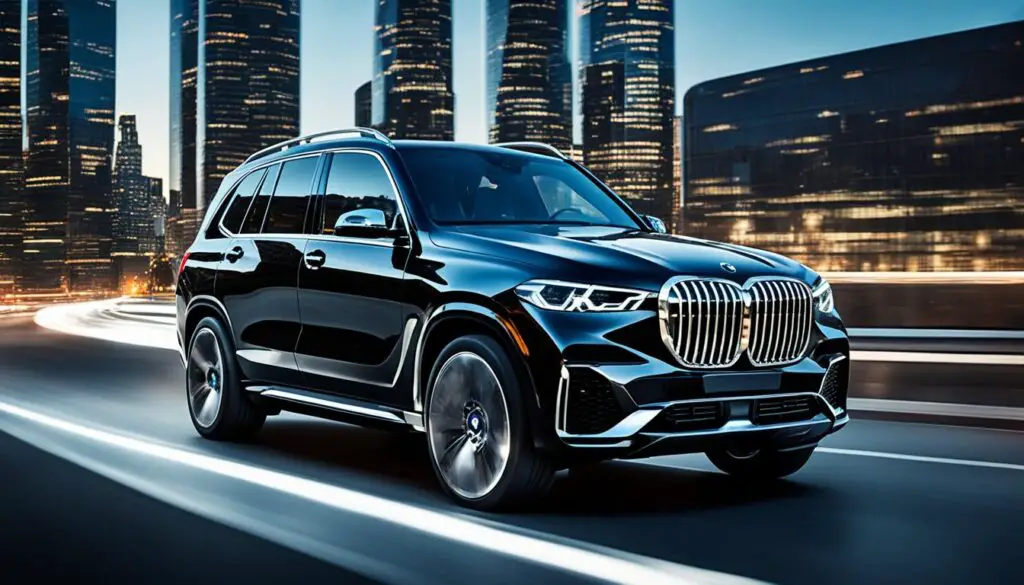
Flagship Models: BMW 7-series vs Mercedes S-Class
The BMW 7-series and the Mercedes S-Class are the epitome of luxury and sophistication in their respective brands. These flagship models offer the ultimate in premium luxury, advanced features, and impressive performance. Whether you choose the BMW 7-series or the Mercedes S-Class, you can expect an unparalleled luxury experience.
Both the BMW 7-series and the Mercedes S-Class come packed with cutting-edge technology and advanced features that redefine automotive excellence. From state-of-the-art infotainment systems to premium sound systems, these flagship models deliver the ultimate in entertainment and connectivity. The luxurious amenities and attention to detail in the interiors further enhance the premium luxury experience.
“The BMW 7-series and the Mercedes S-Class represent the pinnacle of luxury and sophistication.”
While both models exude opulence, they do have distinct characteristics that set them apart. The BMW 7-series is known for its dynamic driving experience, offering a perfect balance of power and agility. On the other hand, the Mercedes S-Class focuses on providing the utmost comfort and a first-class ride, with a smooth and refined driving performance.
BMW 7-series Features:
- Advanced infotainment system with a user-friendly interface
- High-end sound system for an immersive audio experience
- Luxurious amenities and comfortable seating
- Sleek and elegant exterior design
Mercedes S-Class Features:
- State-of-the-art infotainment system with intuitive controls
- Premium sound system for an unparalleled audio experience
- Sumptuous interior with top-notch craftsmanship
- Elegant and timeless exterior styling
Choosing between the BMW 7-series and the Mercedes S-Class is a matter of personal preference and desired features. Both models offer a unique blend of luxury, technology, and performance that is second to none. Whether you prioritize sportiness or refined comfort, you can’t go wrong with either choice.
Maintenance and Repair Costs: BMW vs Mercedes
Owning a BMW or a Mercedes comes with higher maintenance and repair costs compared to economy brands. When considering the long-term ownership of a luxury car, it is essential to factor in these costs.
Both BMW and Mercedes have similar average yearly maintenance costs. However, when it comes to repair expenses, BMW tends to have more expensive parts than Mercedes.
On average, the maintenance cost for BMWs is around £1,300 per year, while for Mercedes, it is around £1,220. These costs include routine maintenance, such as oil changes, filter replacements, and inspections.
When a luxury car requires repairs or replacement of components, the costs can escalate significantly. BMW parts are generally priced higher than Mercedes parts, contributing to the overall higher repair expenses for BMW owners.
It’s important to budget for maintenance and repair costs, as they can significantly impact the total cost of ownership for a BMW or a Mercedes. Regular servicing and timely repairs are crucial to ensuring the longevity and performance of these luxury vehicles.
Comparison of Maintenance Costs:
| Brand | Average Yearly Maintenance Cost |
|---|---|
| BMW | £1,300 |
| Mercedes | £1,220 |
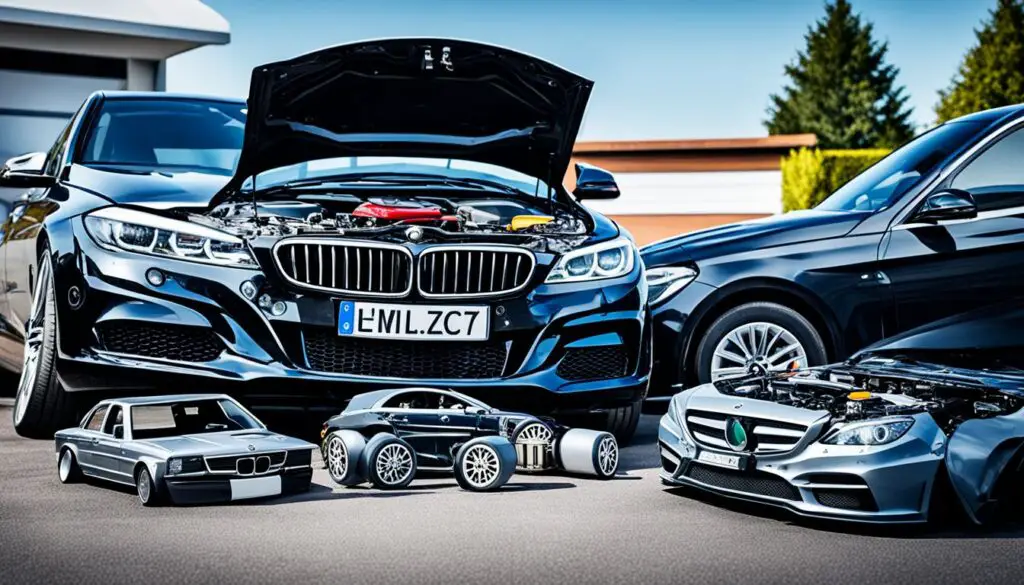
“Owning a luxury car like a BMW or a Mercedes comes with higher maintenance and repair costs. It’s crucial to budget for these expenses to ensure the long-term ownership of these vehicles.”
– Anonymous Luxury Car Owner
Insurance Costs: BMW vs Mercedes
Insuring a luxury car like a BMW or a Mercedes can be more expensive compared to regular cars. However, insurance premiums can vary depending on factors such as the model, year, driver age, and location.
On average, the insurance costs for BMWs tend to be slightly higher than for Mercedes cars. Let’s take a look at the range of insurance premiums for both brands in Lithuania:
| Brand | Insurance Premiums (£) |
|---|---|
| BMW | £907 – £2,191 |
| Mercedes | £562 – £1,987 |
It’s important to note that these figures are averages and can vary depending on individual circumstances. When looking for insurance coverage for your luxury car, it’s crucial to shop around and compare quotes from different providers to find the best coverage and rates that meet your needs.
“By comparing insurance quotes, you can ensure that you’re getting the most competitive rates for your BMW or Mercedes, while still receiving the coverage you require. Don’t settle for the first offer – take the time to explore your options and find the best deal for your luxury car insurance.”
In addition to comparing insurance quotes, there are other ways to potentially lower your insurance costs for a BMW or Mercedes:
- Install security features such as alarms or tracking devices to reduce the risk of theft.
- Consider increasing your deductible, which can lower your premium but may result in higher out-of-pocket expenses in the event of a claim.
- Maintain a clean driving record by practicing safe and responsible driving habits.
By taking proactive steps and conducting thorough research, you can find the right insurance coverage for your BMW or Mercedes, ensuring peace of mind while enjoying the luxury and performance that these renowned brands offer.
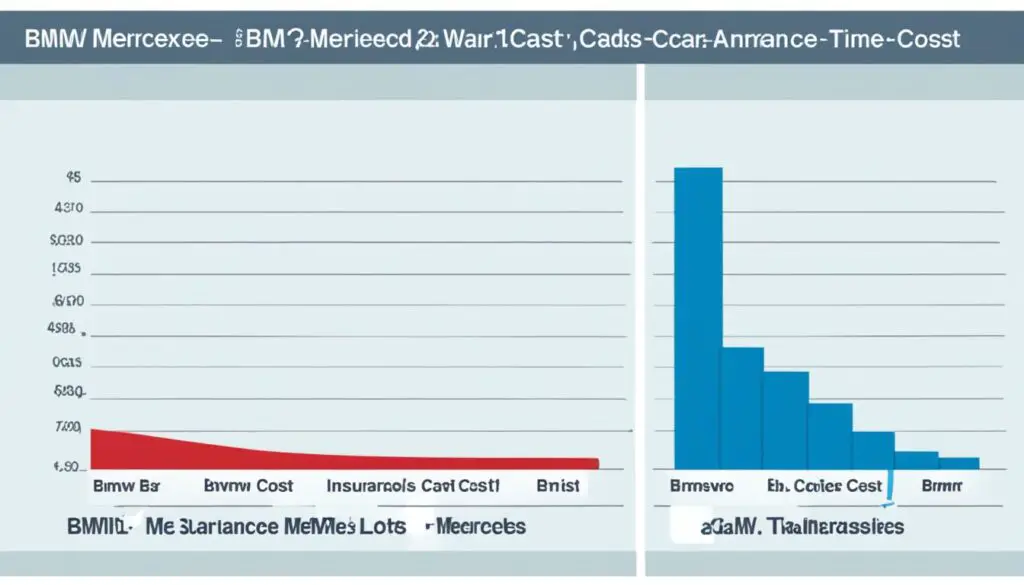
Conclusion
When it comes to choosing between a BMW and a Mercedes, the decision ultimately boils down to personal preference and individual needs. Both brands offer exceptional luxury cars that excel in performance, features, and safety. BMWs are synonymous with a sportier driving experience, while Mercedes delivers a more refined and comfortable ride. It is essential to consider factors such as performance, features, maintenance costs, and insurance costs when making your decision.
For those seeking a dynamic and exhilarating driving experience, a BMW may be the ideal choice. The brand’s reputation for sportiness is well-established, with their vehicles designed to provide agile handling and powerful performance. On the other hand, if your priority is a smooth and luxurious ride, Mercedes offers a range of models renowned for their refined driving dynamics and unparalleled comfort.
When evaluating the value for money, it’s important to weigh the overall ownership costs, including maintenance and insurance expenses. Although owning a luxury car entails higher maintenance and repair costs, the joy and prestige associated with driving a BMW or Mercedes often make it worth it for enthusiasts. Consider your budget and the long-term ownership experience to determine which brand offers better value.
In the end, whether you prefer the sporty flair of a BMW or the sophisticated comfort of a Mercedes, both brands offer an array of luxury cars that cater to different tastes. Research and test drive various models to find the one that aligns with your lifestyle, preferences, and provides the value for money that you desire in a luxury car.

